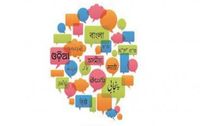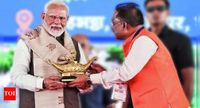NEW DELHI: Prime Minister Narendra Modi reiterated on Sunday that unity is woven into India's diversity, as he cited the greetings sent to him in different languages for the New Year and various upcoming festivals across the country. His remarks come at a time when non-BJP-governed states, particularly Tamil Nadu, have been critical of the central government's three-language policy outlined in the New Education Policy (NEP).
During his monthly radio address, 'Mann Ki Baat', PM Modi read letters sent to him in various languages, emphasizing the significance of these diverse greetings. "The messages have been sent in different languages. But do you know the reason? New Year is starting today and over the next few days in different states of our country. And all these messages are greetings for the New Year and various festivals. That is why people have sent me greetings in different languages," he stated. He further remarked, "These festivals of ours may be in different regions, but they show how unity is woven into the diversity of India. We have to keep reinforcing this spirit of unity, on our way ahead," aiming to bridge divides and present festivals as a unifying thread amid the country's rich tapestry of traditions and languages.
The ongoing debate over the three-language policy has become a contentious issue between the ruling Bharatiya Janata Party (BJP) and the Dravida Munnetra Kazhagam (DMK) party in Tamil Nadu. The DMK, led by Chief Minister M.K. Stalin, has accused the BJP-led central government of attempting to impose Hindi on Tamil Nadu under the guise of the three-language formula, claiming it threatens Tamil culture, identity, and state autonomy.
In response, senior BJP leaders have mounted a robust counter-narrative. Home Minister Amit Shah recently accused the Tamil Nadu government of using the language issue to divert attention from its own alleged corrupt activities, stating that the BJP government at the Centre is not opposed to any south Indian language. This ongoing political tussle illustrates the complexities surrounding language policy in India, where regional identities often clash with national narratives.
Meanwhile, Maharashtra Navanirman Sena (MNS) chief Raj Thackeray also weighed in on the language imposition row. Speaking on the same day, he remarked, "We need to learn from southern states how they have opposed the Hindi language." His comments reflect a growing sentiment among various regional leaders who are wary of perceived central overreach regarding language policies.
In a different context, the state government of Odisha has announced plans to celebrate Odia Pakhya for a fortnight, from April 1 to April 14, 2025, to promote the Odia language, literature, and culture. This initiative comes as part of efforts to reinforce regional identity and pride, particularly in light of the ongoing national debates on language.
Odia Language, Literature, and Culture Minister Suryabanshi Suraj announced the celebration at a media conference on Sunday, stating that various programs are scheduled for this 15-day period. "Odia Day will be celebrated on April 1 at the state, district, and sub-division levels to mark the formation of a language-based state," he explained. The School and Mass Education department will organize events on April 2, while the Department of Handlooms, Textiles, and Handicrafts will hold a program on April 3, themed ‘Our Dress, Our Identity’, to promote traditional Odia wear and the handloom and textile industry.
On April 4, the Labour and Employees’ State Insurance Department will initiate a name plaque campaign in Odia, encouraging businesses to display nameplates in the local language. A cleanliness drive is scheduled for April 6 to maintain the temples and heritage sites of Odisha. Following that, April 7 will be celebrated as ‘Varnbodh Utsav’, marking the distribution of a devotional poem written by Madhusudan Rao that serves as an early introduction to the Odia language.
Additionally, a campaign titled ‘Come, Buy a Book’ will be launched on April 9 to promote Odia literature and encourage reading among the populace. Minister Suraj emphasized that numerous programs will be organized throughout the fortnight to promote, popularize, and spread the Odia language, literature, and culture.
However, the initiative has faced criticism from the opposition Biju Janata Dal (BJD), which has labeled it as a mere spectacle orchestrated by the BJP government to distract from its failures. Deputy Leader of the BJD Legislature Party, Prasanna Acharya, stated, "The government has failed to present its demands to the Centre in a strong manner. Central funds are decreasing, which is affecting the implementation of various schemes in the state. In this scenario, the government speaking of celebrating Odia Pakhya to promote ‘Odia Asmita’ is ridiculous." This criticism highlights the ongoing tensions between regional aspirations and central policies in India.
As the discussions around language policy continue to evolve, it is clear that language remains a potent symbol of identity and cultural pride in India. The contrasting approaches of different states reflect the diverse perspectives on how best to navigate the complexities of linguistic diversity in a nation characterized by its multitude of languages and cultures. Whether through celebrations like Odia Pakhya or political dialogues regarding the three-language policy, the conversation around language in India is far from over.







